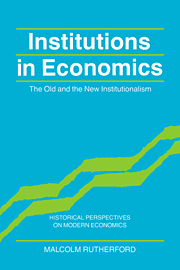Preface and acknowledgements
Published online by Cambridge University Press: 12 January 2010
Summary
This book is a product of my long-standing interest in questions relating to institutions and their role in economic life. Initially, this interest took me to the study of the American institutionalist tradition (now often called the “old” institutional economics, or OIE) and to a series of articles on Veblen, Commons, Mitchell, and Ayres (Rutherford 1980, 1981, 1983, 1984, 1987), a line of work I have continued to pursue (1990a, 1990c, 1992a, 1992b). These pieces are written from the point of view of a sympathetic critic; I do not now think of myself, and never have done so, as an adherent of any of the major research programs contained within the OIE. I am sympathetic to the overall aim of incorporating institutions within economics, and I find certain of the ideas and arguments of old institutionalists of great interest, but I have not discovered within the OIE any approach or model that I could wholeheartedly adopt as my own.
In recent years a new literature on institutions has emerged from more neoclassical, Austrian, and game-theoretic sources, a literature that has become known as the “new” institutional economics, or NIE. Accordingly, I turned my attention to the NIE, and particularly to the comparison of the new institutionalism with the old (Rutherford 1989a, 1989b). My impression of the NIE, however, is that it contains problems almost as severe as, but opposite in kind to, those found in the OIE.
- Type
- Chapter
- Information
- Institutions in EconomicsThe Old and the New Institutionalism, pp. ix - xiiPublisher: Cambridge University PressPrint publication year: 1994



